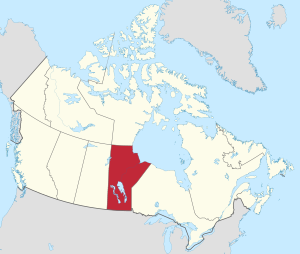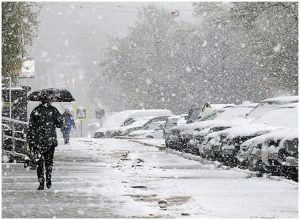When I first moved to Manitoba,  I couldn’t avoid noticing the license plate. Each car proudly proclaimed—even while they were swerving in front of me for the advantage of a few metres—that I had arrived in friendly Manitoba. I made little of the slogan, for I had traveled in several Canadian provinces and been treated to “Wild Rose Country,” “Land of Living Skies,” “Yours to Discover,” “Beautiful British Columbia” “Canada’s Ocean Playground” and Quebec’s “Je me souviens” (which roughly translates as “I Remember” but more accurately represents “I will never forget”). The slogans
I couldn’t avoid noticing the license plate. Each car proudly proclaimed—even while they were swerving in front of me for the advantage of a few metres—that I had arrived in friendly Manitoba. I made little of the slogan, for I had traveled in several Canadian provinces and been treated to “Wild Rose Country,” “Land of Living Skies,” “Yours to Discover,” “Beautiful British Columbia” “Canada’s Ocean Playground” and Quebec’s “Je me souviens” (which roughly translates as “I Remember” but more accurately represents “I will never forget”). The slogans tell little about the province or territory itself, and I expected nothing more from Manitoba’s claim.
tell little about the province or territory itself, and I expected nothing more from Manitoba’s claim.
What I began to notice, as I settled into the province, was its insular nature. A fellow graduate student once told me that Manitobans didn’t like “transients,” which is how she described people who only lived in the province for a few years. Likewise, my ex-girlfriend came home with a story of her boss’ puzzlement over a Winnipegger who had left to marry overseas. The most bewildering aspect of her choice, to him at least, was the notion that anyone would want to leave. He asked, in a kind of plaintive befuddlement, why she would leave, when “all of her friends are here. Her family is here. Why would she want to go?” Such statements were often followed by “she was always a bit strange anyway.”
As an outsider such insular qualities meant little to me, and I didn’t find the people of the province especially unfriendly when compared to other provinces in Canada. In general,  I find that many Canadian urban people are rushed and brusque and rural people more expansive, and Manitoba did little to disabuse me of the notion. My home province, New Brunswick, was filled with friendly Maritimers, but I knew all too well the racism which existed between the French and English. Likewise the animosity toward Indigenous people in the prairie provinces, and the anti-Asian sentiment of the west coast stood out amongst the otherwise relatively friendly greetings of people from those provinces.
I find that many Canadian urban people are rushed and brusque and rural people more expansive, and Manitoba did little to disabuse me of the notion. My home province, New Brunswick, was filled with friendly Maritimers, but I knew all too well the racism which existed between the French and English. Likewise the animosity toward Indigenous people in the prairie provinces, and the anti-Asian sentiment of the west coast stood out amongst the otherwise relatively friendly greetings of people from those provinces.
What I did notice, especially when I was able to travel internationally, is how Canadians would talk about people in the countries they would visit. Although a streak of  anti-immigrant sentiment mars many communities in Canada, those who have traveled—even those who have lounged on a beach in resort-villa Mexico—agree that people are incredibly friendly overseas. The travelers I have met nearly universally exclaim, with a warm appreciation in their voice, about the genuine hospitality of citizens in other countries. Even in cities which are rife with crime—
anti-immigrant sentiment mars many communities in Canada, those who have traveled—even those who have lounged on a beach in resort-villa Mexico—agree that people are incredibly friendly overseas. The travelers I have met nearly universally exclaim, with a warm appreciation in their voice, about the genuine hospitality of citizens in other countries. Even in cities which are rife with crime— at least by Canadian standards—people could be taken into homes and offered dinner by strangers. If directions were needed, the one telling the story would relate how they were bundled into a car and delivered to their destination, any mention of payment was waved away. Such stories are nearly always a feature of the Canadian traveler’s stories, but I’ve met few who consider the implications of their observations.
at least by Canadian standards—people could be taken into homes and offered dinner by strangers. If directions were needed, the one telling the story would relate how they were bundled into a car and delivered to their destination, any mention of payment was waved away. Such stories are nearly always a feature of the Canadian traveler’s stories, but I’ve met few who consider the implications of their observations.
Although the extremity of people’s behaviour overseas does little to change the way the traveler acts once they return, their friendliness—whether it is thought to be an attribute of a warm climate or poverty—is not forgotten. What few consider is their own hospitality, their own social nature, is one which is formed in the cauldron of their cold countries. They forget that  such friendliness is relative, and only exists by comparison with the inhospitable nature of their own country.
such friendliness is relative, and only exists by comparison with the inhospitable nature of their own country.
In fact, the cultures of North America (I can’t speak for Mexico for I have never visited) or north-western Europe are not particularly welcoming. The nearly universal equanimity found by the western traveller has much more to do with their own cultures’ lack of social ability than it does the mystical properties of tropical fruit or bright white beaches. I have known many immigrants or international students in Canada or the United States who have complained about the difficulty of managing the frigid social climate. The north-eastern United States is famous and Torontonians distant and even cutting. In any of the provinces, their fellow students have little interest in learning about their lives, do not automatically invite them out because they happen to share seating, and by times are faintly derisive of them.
Manitoba is not especially terrible, although the insular qualities of the citizenry stand out. As I suggest above, Manitobans rarely leave the province, and leaving for work— such as we were brought up to do in the Maritimes—is either seen as not making a go of it in your own province or abandoning your community. The result of that is that Manitobans grow up with the same friends surrounding them their entire life. When I first moved to the province I noticed that locals had known their best friends since primary school, and they seemed to move forward through life together, none of them changing enough to cause friction and no one leaving to experiment with living elsewhere. Their friendship groups were replete, and they rarely wanted more. The only people I found who were eager for friends were those like me—who’d come from the outside—or those who’d burned so
such as we were brought up to do in the Maritimes—is either seen as not making a go of it in your own province or abandoning your community. The result of that is that Manitobans grow up with the same friends surrounding them their entire life. When I first moved to the province I noticed that locals had known their best friends since primary school, and they seemed to move forward through life together, none of them changing enough to cause friction and no one leaving to experiment with living elsewhere. Their friendship groups were replete, and they rarely wanted more. The only people I found who were eager for friends were those like me—who’d come from the outside—or those who’d burned so  many bridges they had huge holes in their social circles. The first group jumped at the chance to fill their gaps, although they were just as eager to move on when a better fit appeared, and the second group were as quick to set fire to their new relationships they had been with their old.
many bridges they had huge holes in their social circles. The first group jumped at the chance to fill their gaps, although they were just as eager to move on when a better fit appeared, and the second group were as quick to set fire to their new relationships they had been with their old.
I’d left the friendliness of eastern Canada, especially if the new arrival is as white as the locals, to come to Manitoba, but easily assumed comparisons between the two regions of Canada meant little alongside the cultures of the world. The social nature of many overseas strangers, regardless  of social status or occupation, and with nothing to gain beyond a few minutes of banter while they are waiting for a bus, stands out to me as well as my fellow Manitobans. Most countries of the world do not require a license plate, I often say to my fellow Manitobans, although that arouses more ire than reflection, but I tell myself I have lived here long enough (no longer a transient) to have the right.
of social status or occupation, and with nothing to gain beyond a few minutes of banter while they are waiting for a bus, stands out to me as well as my fellow Manitobans. Most countries of the world do not require a license plate, I often say to my fellow Manitobans, although that arouses more ire than reflection, but I tell myself I have lived here long enough (no longer a transient) to have the right.
